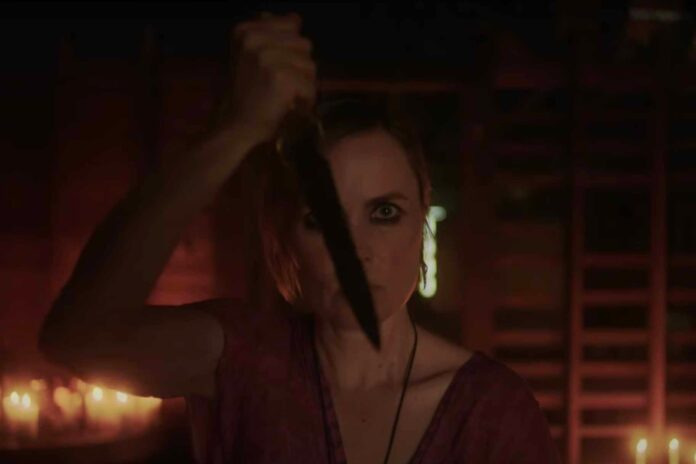[ad_1]
If you’re a small, first-time filmmaker or even if you’re an established major studio, one of the surest, safest ways to wring a decently solid return out of your super-skinny film budget is to make a horror movie. Compared to other genres, horror flicks are cheap to make; their success isn’t necessarily tied to expensive A-list casting or cutting-edge special effects; and most importantly, horror-hungry fans have for decades demonstrated an enduringly resilient tendency to give even the lowest-budget scary movie a sporting chance.
Lots of aspiring actors and creators find their entry point into the wider film industry through an early horror flick or two, and that’s exactly the backdrop for how Devil’s Workshop, streaming here on Peacock, starts its slow-boil supernatural story. Starring Pitch Black alum Radha Mitchell alongside Emile Hirsch (Savages, Once Upon a Time in Hollywood) and 13 Reasons Why veteran Timothy Granaderos, it’s a patiently-unfolding peek into the tortured psyches of starving-artist actors forever stranded on the wrong side of success… and into the insane lengths to which they will (or won’t) go to achieve their elusive breakout.
Exorcising the slacker within: Radha Mitchell’s role in Devil’s Workshop
Released in 2022, Devil’s Workshop leans heavily into the “psychological” side of its psych-horror trappings for most of its brief 86-minute runtime, before violently erupting — in a shocking story twist that upends most of what came before — into outright supernatural horror. Until things get seriously sideways with the movie’s fiery, bloody, and legitimately gory final rug pull, it offers a nicely tense and insightful glimpse into the lives of upstart actors whose slacker habits keep their acting dreams forever out of reach — no matter how convinced they are that their big break is just around the bend.
Granaderos serves as the movie’s main character, a 35-year-old struggling actor named Clayton. Bearing the lifelong pain of a childhood family tragedy, he answers the casting call for a low-rent DIY-horror flick called Psychic Highway, eventually contending for the movie’s lead role with just one other actor: an obnoxiously overconfident stoner named Donald (played by Hirsch), the kind of guy whose entitled approach to achieving eventual stardom nets him a small circle of sycophantic friends while alienating pretty much everybody else.
With only a few days to prepare for their final casting callback, Donald and Clayton take decidedly separate paths toward studying up for the coveted character role — a demonologist — before audition day arrives. Donald shacks up in a cozy stoner’s den at the house of his friend Nikki (Sarah Coffey), where he merges low-effort acting exercises with shot-slamming drinking games. Clayton, meanwhile, goes about things more earnestly, whipping up a quick online ad in the hope of finding a real demonologist who can give him a fast crash course in what theology’s darker side is really all about.
That’s how Mitchell’s character — an aging actor-turned-spirit seeker named Eliza — enters the picture. From the moment the door swings open at her isolated country farmhouse, it’s clear that Clayton is gonna have to set aside his perpetual stuck-in-his-teens social insecurities if he has any hope of hanging out with a real one like Eliza. She’s a true believer in this whole demon thing; she’s scholarly and fluent in the language and lore of exorcism, and she has absolutely no use for any of the timid niceties of slacker etiquette that hold a nice guy like Clayton back. If he wants to learn about real demons, she reasons, he’s first got to purge the metaphorical ones within himself — and, as it turns out, her cleansing methods tend to leave little distance between what’s metaphorical and what’s real.
Mitchell is awesome to watch as an eccentric, completely self-confident spirit specialist whose ironbound will rapidly overwhelms Clayton’s weirded-out misgivings. It’s not long before she has him reciting cryptic Latin phrases and standing in front of a captive goat while holding a butcher’s knife; ritual preparations for a big-finish exorcism event that, she says, will rid him of all the weighty emotional baggage that’s been crippling his career.
If only Devil’s Workshop would’ve followed that line of thinking to its fictional story conclusion, it might’ve earned the film a bit more notoriety — especially given its genuinely good performances from Granaderos, Hirsch, and (particularly) Mitchell. Instead, things take a completely unexpected turn in the movie’s closing minutes, culminating in a sudden, twisted freakout inside Eliza’s creepy exorcism pad.
On its own, the movie’s hellish finale delivers scary scenery that’s satisfyingly horrific enough — complete with seared flesh, exposed sinew, and an infernal, quasi-incestuous love rite that’ll have viewers wondering where Eliza draws the dividing line between conventional motherhood and satanic ritual romance. Without spoiling everything, it’s also the kind of hyper-demonic meltdown that not everyone will get to walk away from… and while it does deliver the sort of payoff that at least one character craves, it’ll also leave you puzzling over whether the movie’s earlier story threads end up actually meaning much in the end.
But in a low-budget fright flick like Devil’s Workshop, the real payoff isn’t so much in where the story actually arrives; instead, it’s all about the larger journey. As the film’s TikTok-style social media coda seems to suggest during its ending credits roll, it’s the kind of movie where everybody, whether they know it or not, loses something — even (and perhaps especially) those whose lives keep slacking blithely along into the cluelessly comfortable future.
[ad_2]
Source link








